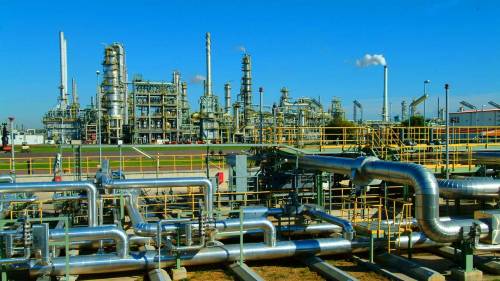
NIGERIA owns four refineries with a combined capacity of 445,000 barrels per day. They have not refined crude oil for over two decades except the old Port Harcourt Refinery which was restarted on November 26. Two are in Port Harcourt, and one each in Warri and Kaduna.
The Federal Government has sunk over $20 billion into the rehabilitation with no fruitful results.
However, the Nigerian National Petroleum Company Limited has restarted the 60,000bpd old PH Refinery, which is the smallest and the oldest. A sum of $1.5 billion was spent on the rehabilitation. This is a game-changer.
Towards the end of President Olusegun Obasanjo’s second term in 2007, his government sold a 51 per cent stake in the two PH refineries at $561 million, with $300 million paid upfront by the Bluestar Consortium. However, the late President Umaru Yar’Adua cancelled the sales after he assumed office later that year.
Following the reversal, the two refineries produced almost nothing significant for over 17 years until November 26 when the old PH refinery restarted.
The NNPC is searching for private operators to manage the restarted refinery.
The question is that with one of the four refineries is back in operation, what should the Federal Government do with all of them?
The PUNCH Editorial Board unequivocally advises that all the refineries be sold.
Indeed, the Bola Tinubu administration has deregulated the downstream sub-sector. So, it is not right for the Federal Government to start looking for funds again to fix refineries that could be sold to the private sector which can raise the capital to turn them around and pay tax to the government.
Experience has shown in over four decades that the government is incapable of running the refineries effectively. Though the old PH refinery has been successfully rehabilitated, there is that fear that government interference and lack of accountability could set in again and draw it back.
Canada has 16 major refineries with Shell Canada, Imperial Oil, and Suncor Energy as the biggest players. While Petro Canada was once publicly owned, the government sold its stake to Suncor. Unlike the loss-making NNPC refineries, the three major refineries there made a profit of $11.75 billion in 2007, up 10 per cent from $10.72 billion in 2006.
Nigeria can also learn from the United States. As of January, none of the 132 refineries in America is government-owned. The refineries processed 18.4 million bpd in January.
The turnaround of the Eleme Petrochemicals plant post-privatisation strengthens the argument for the sale of all the refineries. Years ago, the plant was a huge loss-making subsidiary of the NNPC. Before it was sold in 2006, it had an untenable debt burden, needed capital investment, and would not be profitable for its buyer for several years.
Subsequently, 75 per cent of the company’s shares were sold to the Indorama Group and the turnaround began. According to the Bureau of Public Enterprises, Indorama immediately embarked upon a $130 million turnaround maintenance and capital investment programme, returning the facility to operating condition within four months.
Therefore, Tinubu should privatise the refineries. The benefits are many, including providing jobs, freeing the government of budgetary expenditures, availability of products, and providing competition for the Dangote Refinery.
Another option is to do targeted privatisation by selecting some major players to operate the refineries.
Nigeria, being a major oil-producing country, is supposed to be an oil refining hub, providing petroleum products to the West African sub-region and beyond. Since the opening of the Dangote Refinery, Nigeria is coming closer to playing that role. Privatising the government refineries will be a huge step in that direction
END

Be the first to comment